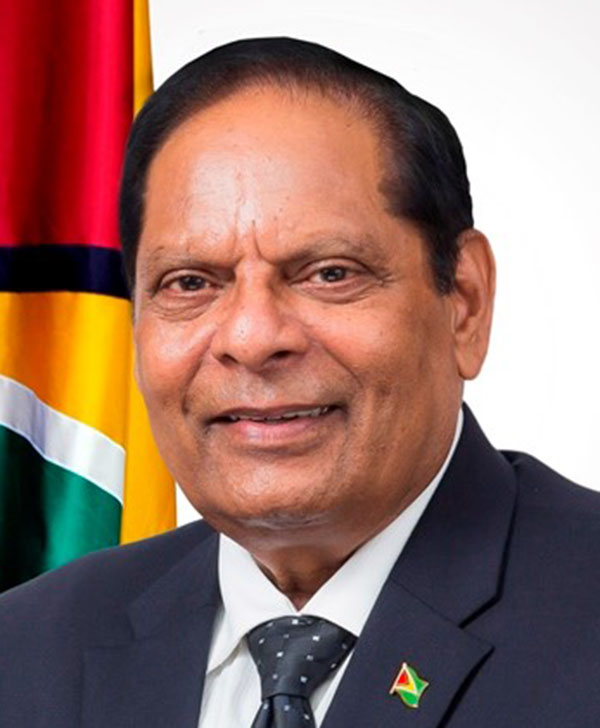Prime Minister Moses Nagamootoo yesterday said that the emergency measures ordered by Minister of Public Health Volda Lawrence to prevent the spread of the novel coronavirus disease (COVID-19) are aimed at avoiding people clustering and not at stopping the economic activity of the country entirely.
“…These measures are intended to be directed to certain services. Services that would involve people clustering at places like bus parks, stelling and in the boats, other places of social activities…That is what the intention is. The intention is a public health measure/s that is intended to restrict clustering, restrict large number of persons being at [a] certain space. It is not directed at the economy, it is not directed at production. Facilities can continue to operate,” Nagamootoo assured.
He was speaking during a virtual press conference held yesterday to discuss the work of the National COVID-19 Task Force (NCTF) and the order issued Lawrence regarding the emergency measures. Nagamootoo is the Chairman of the NCTF.
On Friday evening, the government announced a one-month countrywide lockdown with a 6pm to 6am curfew and a restriction on services except for those deemed essential.
The “emergency measures” are being effected under an order in the name of Lawrence pursuant to an earlier direction by Presi-dent David Granger, given under the Public Health Ordinance.
The measures, which take effect from the April 3, 2020 and will last for one month unless earlier terminated, come amid growing fears that the COVID-19 pandemic could lead to as many as 20,000 cases here by May 5th. There are also concerns that the country does not have the medical facilities and personnel to deal with such a crisis.
In the order issued, services which are deemed “essential” include: hospitals, healthcare and medical services including pharmacies, drug stores and private veterinary services; nursing homes, orphanages, shelters and other related care centers; immigration; the Revenue Authority; electricity services; water supply services; the disciplined forces; prison services; solid waste management, sewerage and janitorial services; air traffic control; Demerara Harbour Bridge and Berbice River Bridge; hotels and accommodation and factories, manufacturers or distributors of food supplies and essential goods including medical supplies where the Minister of Public Health has determined that the continuation of these operations do not pose a risk to public health.
Not restricted
The media was not included as an essential service.
However, Nagamootoo yesterday clarified that the work of journalists and the media including broadcast and print media is not affected. “Journalists have to work, media will have to carry the news and so we didn’t list it as an essential service, we thought that this is one of the services that one would have assumed that it is not restricted,” he said.
In addition, he noted that services which falls under the telecommunications field, such as the call centres, and telephone and internet services, are communication mechanisms that are not restricted in their operations.
According to Nagamootoo, the measures are not intended to “lock down” production and stop activities in sectors like oil and gas, forestry, rice, sugar and the economy at large.
He said that Minister of Finance Winston Jordan had also addressed some of the concerns highlighted by the business and private sector as it relates to the measures. “…And we will continue to address them and engage them [to] participate in the effort of producing, manufacturing products that will be needed to fight the coronavirus, to crush it in Guyana as a collective effort,” he said.
As it relates to non-essential workers, Nagamootoo related that they can work during the stipulated time (6am to 6pm). Public transportation, including minibuses and taxis, are also restricted to operate only during the stipulated time.
For those who cannot leave their homes for work as a result of the situation, Nagamootoo said that the NCTF is currently engaged in discussions about measures that could be implemented to provide social relief for them.
The measures that have been taken are for the health security and safety of persons, he said. “To protect the spread of the disease, to contain it, to crush it,” Nagamootoo noted.
He said that the task force is concerned about the deaths so far. “We think that four deaths, even one death is one too many and this is a serious, very serious health emergency facing our nation as well as the world at large,” Nagamootoo added.
To date, he said, 87 advisories have been issued in relation to COVID-19, focusing mostly on sanitisation, cleaning of hands, social distancing, etc.
“We felt that those measures, advisories by themselves were not enough to convey to our people the seriousness of this disease and the rapid pace at which it could spread and it could become, it is a contagion but it could become a challenge to our health system and the facilities that we have in the health system,” he explained.
The prime minister said the restrictions to be at home is a general appeal to the public.
“We want everyone, those who have no essential duties to perform, to stay at home, stay in your own yards and avoid going out there and contributing to either the spread of this contagion or being infected and then one infected persons will then be a carrier…Stay at home is critical in this situation,” he said.
Nagamootoo said that the situation will be monitored while noting that it takes the effort of the entire society to fight the disease. “This is about coming together to fight an enemy that is invisible. As I said, it is not invincible; we can beat it if we all come together,” he said.






